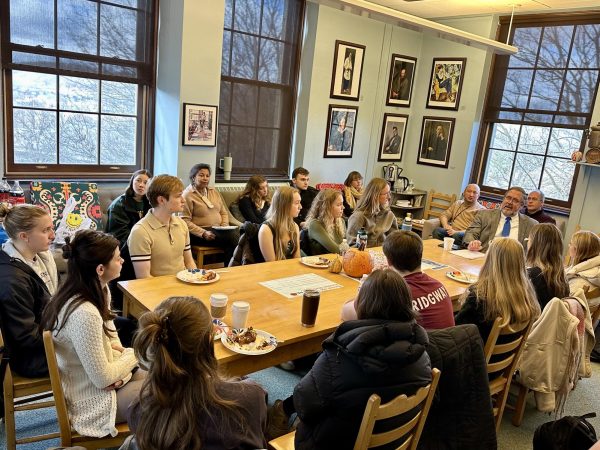Colgate Community Embraces the “F-Word”
Colgate’s first Brown Bag lunch of the year took place on September 2. Hosted by the Center for Women’s Studies, the event’s anticipated crowd of 100 quickly surpassed 200, as students and faculty gathered to hear from three student
panelists on the topic of feminism.
Creatively titled “The F Word,” the lunch facilitated discussion on what it means to be a feminist at Colgate and in the larger world.
The panel hosted three upperclassmen: senior Tess Cumpstone, junior Samantha Hom and senior Damaly Ferreira. Each of these young women spoke about her journey in becoming a part of the feminist movement and to the next step for them as individuals within the movement.
“Going into Colgate, I grew up thinking that being a feminist wasn’t relevant or necessary to the way things were today. I thought that people who self-identify as feminists were just being nit-picky, or searching for other things to complain about, which is all very wrong,” Cumpstone said.
She continued to describe a quintessential “click moment” experienced by many young adults, in which they begin to see the need to self-identify as
a feminist.
“Freshman year, unfortunately, my ‘click moment’ happened because I was exposed to several incidents of sexual assault on this campus. Such an obvious and extreme form of oppression based solely on someone’s gender – it was impossible for me to continue to go on without realizing how relevant feminism was,” Cumpstone said.
Hom also highlighted the importance of a “click moment.” Her moment happened when she visited a friend at Cornell University and was frightened that two male strangers might make an
inappropriate sexual advance.
“I immediately felt unsafe, and that was odd because I never remembered feeling
unsafe in the presence of men before
college … I realized that the problems I was experiencing at Colgate are not
experienced everywhere necessarily,” Hom said.
After detailing their personal growth in the feminist movement, each of the young women talked generally about feminism itself and the connotation it has in modern society.
“The title of the Brown Bag today is ‘The F-Word’, which is feminism. I don’t think we should change the word itself; we should change our attitude about the word,” Hom said. “We all, in this room, have the power to change [the negative connotation].”
To help establish a baseline definition of feminism, Cumpstone quoted
American author and feminist Bell Hooks. “Simply put, feminism is a movement to end sexism, sexist exploitation and oppression,” writes Hooks in her book Feminism is for Everybody: Passionate Politics.
Each of the panelists noted that feminism is a constant learning process. It requires continual growth and self-reflection.
“A lot of people don’t realize that feminism is a process. It’s a learning process. You don’t declare that you’re a feminist and then all of a sudden a light switch goes off and you channel the mysterious inner-workings of the feminist universe and know all the truths. You’re constantly questioning what you’ve learned and what you’re learning. You’re constantly trying to figure out the way that other people are learning and why they think the way they do. It’s a lot of give and take, and it’s very humbling to think this way,” Cumpstone said.
Feminism, the panelists noted, is also a process that requires learning about other forms
of oppression.
“It became very easy to combine … I can’t be a feminist without advocating against racism, without being an ally for LGBTQ,” said Ferreira.
Ferreira continued by referring to Caribbean-American writer and feminist Audre Lorde.
“I am not free while any woman is
unfree, even when her shackles are very different from my own,” wrote Lorde.
The Brown Bag lunch concluded with a question and answer segment, during which members of the audience asked specific questions of the panelists. One question asked how the panelists would “stay strong” in their convictions within a non-feminist world.
“My anger is still there. It hasn’t gone away, and I don’t think it will for a while. It’s tiring, honestly, to always give a comment or to hear something and to speak up about it, and you have to choose your battles … but as long as there’s still something to be mad about, I’m still going to be angry about it. That’s what keeps me going,” Hom said.





